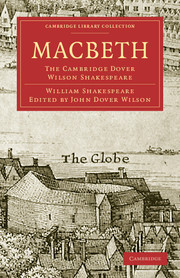THE STAGE-HISTORY
Published online by Cambridge University Press: 07 September 2010
Summary
Macbeth has been so constantly acted that only a severely selective record is here possible. As noted above, contemporary allusions point to performances as early as 1606. Perhaps the most obvious of these is that in 5.1. 26–32 of The Knight of the Burning Pestle (c. 1607) which runs:
When thou art at thy table with thy friends,
Merry in heart, and filled with swelling wine,
I'll come in midst of all thy pride and mirth,
Invisible to all men but thy self,
And whisper such a sad tale in thine ear
Shall make thee let the cup fall from thy hand,
And stand as mute and pale as death itself.
These lines, spoken by Jasper ‘with his face mealed’, were clearly intended to recall the apparition of Banquo on the stage, and suggest that the stage business of dropping the cup, mentioned by Garrick, and used by Charles Kemble and many others, goes back to the original staging at the Globe. The earliest explicit notice of performance, however, as has also been mentioned above, is that by the astrologer, Simon Forman, in his Bocke of Plaies (1611), which describes the play as he saw it at the Globe on Saturday, 20 April 1611. His account shows him most of all impressed by the meeting with the Witches, the blood on the hands of the guilty pair, which ‘could not be washed of by Any meanes’, the ghost of Banquo, which ‘came and sate down in his cheier behind’ Macbeth as he stood up to ‘drincke a Carouse to him’, and Lady Macbeth's sleep-walking, in which she ‘talked and confessed all’.
- Type
- Chapter
- Information
- MacbethThe Cambridge Dover Wilson Shakespeare, pp. lxix - lxxxiiPublisher: Cambridge University PressPrint publication year: 2009First published in: 1947



